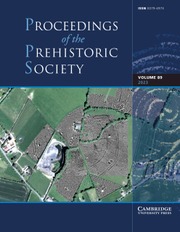Article contents
Armorican Coin Hoards in the Channel Islands
Published online by Cambridge University Press: 27 May 2014
Extract
‘He lifted a large boulder and discovered five hundred Armorican coins. For countless years a large boulder had lain undisturbed in the corner of a field belonging to Miss Amy. … Time and again it had been scraped and chipped by ploughs, but nobody had ever thought of moving it. But on Tuesday morning it fouled the plough once too often and seventeen-year old Peter Langlois decided that it was time to remove it’. This passage, quoted from the Evening Post of 25th January last, records one of the most important discoveries ever made in the island; it was made on 22nd January 1957, at Le Catillon de Haut, in the parish of Grouville.
Jersey has the distinction of being the home of a very active learned society with a Museum that forms a true centre of archaeological research; it is well known to its citizens and has a reputation reaching far beyond its borders. My friends Father Burdo, Major Rybot, the learned numismatist, and Mr Emile Guiton, the Curator, were so kind as to invite me to examine this latest discovery, of which I made a preliminary inventory in February. Its interest is very great.… But before proceeding to an examination of the hoard I should like to place it in its proper perspective and to give a short summary of earlier discoveries, in so far as these are known. Mrs Jacquetta Hawkes has already listed these finds in her Archaeology of the Channel Islands. Here I shall confine myself to the numismatic details that characterize them.
- Type
- Research Article
- Information
- Copyright
- Copyright © The Prehistoric Society 1958
References
page 203 note 1 In fact, the whole hoard has not been given to the Jersey Museum. I shall only speak of the collection that I have studied and not of the 765 coins or more that form the whole hoard.
page 209 note 1 I heard at Guernsey the important and well documented lecture of Dr Mourant; here I have discussed this question with the President, Mr Ralegh Radford, with Father C. Burdo and with Professor P. R. Giot. My own impression that the level of the sea between Jersey and the Cotentin must have been appreciably lower in Celtic times, perhaps by as much as 20 ft., was largely borne out by the opinions of these scholars.
- 2
- Cited by


